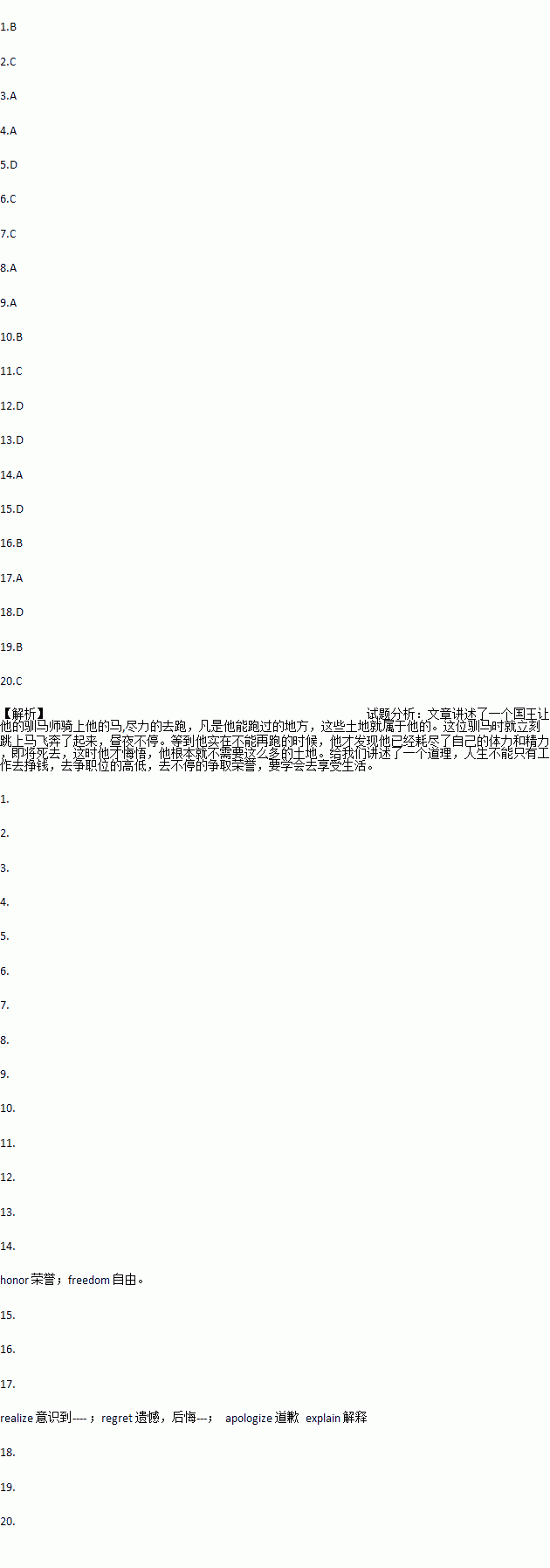题目内容
A long time ago, there was an emperor(皇帝). One day he told his horseman that if he could ride on his horse and ____ as much land area as he liked, he would give him the area of land he had covered. ____ enough, the horseman quickly jumped onto his horse and _____as fast as possible to cover as much land area as he could. He ____ riding and riding, whipping the horse to go as fast as possible. Even when he was ____ or tired, he did not stop ____ he wanted to cover as much area as possible. When he at last covered a large amount of land, he was exhausted and was __ . Then he asked himself, “Why did I ____ myself so hard to cover so much land area? Now I am dying and I only ____ a very small area to ____ myself.”
The above story is ____ to the journey of our ____. We push ourselves very hard every day to make more ____, to gain power or recognition. We neglect(疏忽,忘记) our ____ , time with our family and to appreciate(欣赏) the surrounding ____ and the things we love to do. One day ____ we look back, we will ____ that we don’t really need that much,______then we cannot turn back time for what we have _____
Life is not about making money. Life is definitely(肯定地) not about work! Work is only ____ to keep us living so as to enjoy the beauty and pleasures of life.
1.A. use B. cover C. work D. get
2.A. Good B. Strange C. Sure D. Interesting
3.A. rode B. ran C. expanded D. struggled
4.A. kept on B. asked for C. gave up D. succeeded in
5.A. sad B. excited C. confused D. hungry
6.A. but B. so C. because D. if
7.A. sleeping B. arguing C. dying D. smiling
8.A. push B. make C. destroy D. prove
9.A. need B. have C. find D. show
10.A. live B. bury C. support D. sleep
11.A. useful B. certain C. similar D. special
12.A. future B. past C. history D. life
13.A. friends B. progress C. discoveries D. money
14.A. health B. career C. honor D. freedom
15.A. things B. condition C. people D. beauty
16.A. before B. when C. unless D. since
17.A. realize B. regret C. apologize D. explain
18.A. or B. until C. however D. but
19.A. saved B. missed C. reduced D. won
20.A. possible B. probable C. necessary D. suitable


 ogy Sydney, made From Sydney With Love about two Indian students falling in love with some of the 8. (building) of Sydney University. By 2014, the number of Indian students in Australia was rising again.
ogy Sydney, made From Sydney With Love about two Indian students falling in love with some of the 8. (building) of Sydney University. By 2014, the number of Indian students in Australia was rising again.